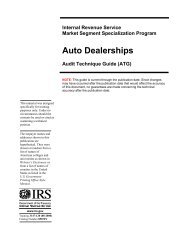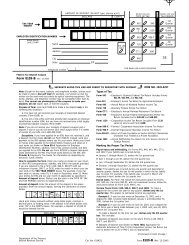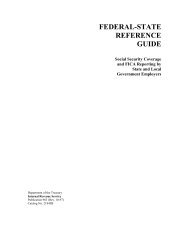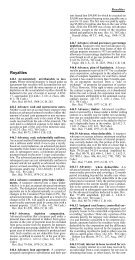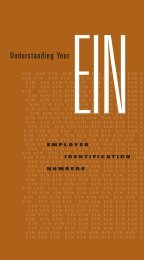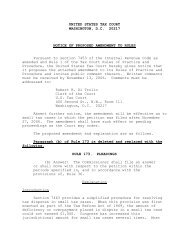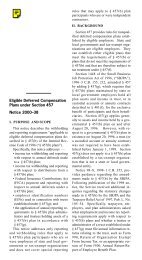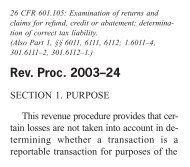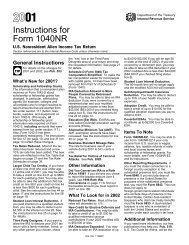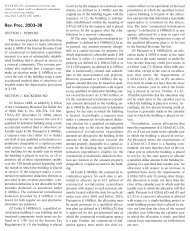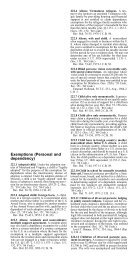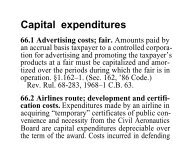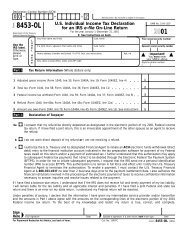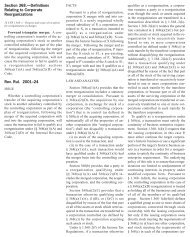Exempt organizations - Uncle Fed's Tax*Board
Exempt organizations - Uncle Fed's Tax*Board
Exempt organizations - Uncle Fed's Tax*Board
Create successful ePaper yourself
Turn your PDF publications into a flip-book with our unique Google optimized e-Paper software.
with regard to certain income of cooperative telephone<br />
companies exempt under section<br />
501(c)(12).<br />
Notice 92-33, 1992-2 C.B. 363.<br />
218.223 Cooperatives; electric; sale of excess<br />
fuel. An electric cooperative’s sale of excess fuel<br />
at cost in the year of purchase is not income for<br />
purposes of determining compliance with the 85<br />
percent member-income requirement.<br />
§1.501(c)(12)-1. (Sec. 501, ’86 Code.)<br />
Rev. Rul. 80-86, 1980-1 C.B. 118.<br />
218.224 Cooperatives; electrical supplies or<br />
housing. A nonprofit cooperative organization<br />
that sells electrical equipment to its members and<br />
performs incidental installation and repair service<br />
in connection with the sales and a cooperative<br />
housing organization operated for the personal<br />
benefit of its tenant-owner members, are not “like<br />
<strong>organizations</strong>” under section 501(c)(12), therefore,<br />
neither qualify for exemption.<br />
§1.501(c)(12)-1. (Sec. 501, ’86 Code.)<br />
Rev. Rul. 65-201, 1965-2 C.B. 170.<br />
218.225 Cooperatives; farmers; alcohol produced<br />
for making gasohol. A cooperative<br />
association that, in connection with its marketing<br />
function, processes its members’ agricultural<br />
products into alcohol for making gasohol qualifies<br />
as an exempt farmers’ cooperative. §§1.521–1,<br />
1.1381-1. (Secs. 521, 1381; ’86 Code.)<br />
Rev. Rul. 81-96, 1981-1 C.B. 359.<br />
218.226 Cooperatives; farmers; allocation of<br />
nonpatronage income. The allocation of income<br />
of a farmers’ cooperative from the handling and<br />
storage of grain of the Commodity Credit Corp.<br />
during the fiscal year ended May 31, 1954, which<br />
is distributed on a patronage basis to persons who<br />
have done business with the association during<br />
any or all of the fiscal years 1949–1954, will not<br />
affect its exempt status. Amounts so allocated<br />
may be deducted by the association for the year<br />
ended May 31, 1954, provided the patronage distribution<br />
is timely made. §39.101(12)–1. (Sec.<br />
101, ’39 Code; Sec. 501, ’86 Code.)<br />
Rev. Rul. 55-591, 1955-2 C.B. 553.<br />
218.227 Cooperatives; farmers; allocation of<br />
nonpatronage income and losses. A farmers’<br />
cooperative association may, without jeopardizing<br />
its exempt status, allocate nonpatronage<br />
income and losses to the department to which the<br />
income and losses relate, provided that the allocation<br />
is not discriminatory among patrons similarly<br />
situated. §1.521–1. (Sec. 521, ’86 Code.)<br />
Rev. Rul. 67-128, 1967-1 C.B. 147.<br />
218.228 Cooperatives; farmers; broad business<br />
powers. A farmers cooperative association<br />
may be exempt even though its articles of incorporation<br />
include broad business powers. I.T. 1914<br />
superseded. §1.521–1. (Sec. 521, ’86 Code.)<br />
Rev. Rul. 68-496, 1968-2 C.B. 251.<br />
218.229 Cooperatives; farmers; by-products<br />
sold nonproducers. A farmers’ cooperative<br />
engaged in the production and distribution of<br />
petroleum products may disregard sales on the<br />
open market of by-products not usable by its<br />
patrons and the value of petroleum products<br />
exchanged with other refineries, in order to utilize<br />
its output and save unnecessary transportation<br />
costs, in determining whether its purchases for<br />
persons who are neither members nor producers<br />
exceed 15 percent of the value of all purchases.<br />
(Rev. Rul. 54-12). Distinguished by Rev. Rul.<br />
67–346 dealing with exchanges for an unlike<br />
product. Modified to provide that the sale of byproducts<br />
to nonproducers may not, after August 4,<br />
1969, be disregarded in computing the 15 percent<br />
limitation. (Rev. Rul. 69-417). §§39.101(12)-1,<br />
1.521-1, 301.7805-1. (Sec. 101. ’39 Code; Secs.<br />
521,7805, ’86 Code.)<br />
Rev. Rul. 54-12, 1954-1 C.B. 93; Rev. Rul.<br />
69-417, 1969-2 C.B. 132.<br />
218.230 Cooperatives; farmers; care and<br />
harvesting of patrons’ crops. A farmers’ cooperative<br />
association whose only activities consist of<br />
caring for and maintaining its patrons’ orchards<br />
and harvesting their crops, does not qualify for<br />
exemption as an association described in section<br />
521. (Sec. 521, ’86 Code.)<br />
Rev. Rul. 66-108, 1966-1 C.B. 154.<br />
218.231 Cooperatives; farmers; Commodity<br />
Credit Corporation income. Grain stored in a<br />
nonexempt cooperative was pledged as security<br />
for loans to a farmer-producer under the price support<br />
program. The Commodity Credit Corporation<br />
paid storage charges which under section 522<br />
(replaced in effect by 1382) constitute income<br />
allocable to members as patronage dividends<br />
excludable from the cooperative’s income before<br />
the default but constitute income not derived from<br />
patronage after the default. §1.61–5. (Secs. 61,<br />
1382; ’86 Code.)<br />
Rev. Rul. 59-107, 1959-1 C.B. 20.<br />
218.232 Cooperatives; farmers; distribution<br />
requirements. A farmers’ cooperative may, without<br />
jeopardizing its exempt status, make cash payments<br />
in full where the patronage dividends or<br />
nonpatronage distribution is $10 or less, and may<br />
pay $10 or 20 percent of the total dividend, whichever<br />
is greater, on all dividends in excess of $10.<br />
§1.521-1. (Sec. 521, ’86 Code.)<br />
Rev. Rul. 66-152, 1966-1 C.B. 155.<br />
218.233 Cooperatives; farmers; distributions<br />
beyond fixed dividends. A farmers’ cooperative<br />
association does not qualify for exemption where<br />
its stockholders are permitted to participate in the<br />
profits of the association beyond the fixed dividends<br />
upon dissolution or redemption of their<br />
stock. §1.521–1. (Sec. 521, ’86 Code.)<br />
Rev. Rul. 69-431, 1969-2 C.B. 133.<br />
218.234 Cooperatives; farmers; emergency<br />
purchases from nonproducers. The exempt status<br />
of a farmers’ cooperative marketing association<br />
will not be adversely affected by emergency<br />
purchases of farm products from nonproducers to<br />
fulfill outstanding orders based on normal crop<br />
expectations. However, such purchases must be<br />
caused by unforeseen circumstances to qualify as<br />
emergency purchases. §1.521–1. (Sec. 521, ’86<br />
Code.)<br />
Rev. Rul. 69-222, 1969-1 C.B. 161.<br />
218.235 Cooperatives; farmers; equitable<br />
allocation. An exempt farmers’ cooperative that<br />
operates a grain elevator branch, a soybean processing<br />
branch, and establishes a feed yard branch<br />
financed by selling preferred debentures to its<br />
members, that allocates the feed yard earnings be<br />
tween the debenture holders and the other<br />
branches according to the feed source and allocates<br />
the grain and soybean branchs’ earnings<br />
according to the branchs’ individual patronage,<br />
thus resulting in debenture and nondebenture<br />
holders receiving different dividends for identical<br />
marketing, is using a method of operation that<br />
does not affect its exempt status. §§1.521-1,<br />
1.1388-1. (Secs. 521, 1388; ’86 Code.)<br />
Rev. Rul. 74-567, 1974-2 C.B. 174.<br />
218.236 Cooperatives; farmers; exchange of<br />
products with nonmember producers. A product<br />
processed by an exempt farmers purchasing<br />
cooperative and exchanged for an unlike product<br />
processed by a nonmember nonproducer will be<br />
considered to have been purchased by the cooperative<br />
for the nonmember nonproducer in determining<br />
whether the value of purchases made for<br />
persons who are neither members nor producers<br />
exceeds 15 percent of the value of all purchases.<br />
<strong>Exempt</strong> <strong>organizations</strong><br />
The nonmember nonproducer will be considered<br />
a patron of the cooperative, and the amount of the<br />
product delivered to the other patrons of the cooperative<br />
by the nonmember nonproducer will be<br />
considered a sale to them by the cooperative. Rev.<br />
Rul. 54-12 distinguished. §1.521-1. (Sec. 521,<br />
’86 Code.)<br />
Rev. Rul. 67-346, 1967-2 C.B. 216.<br />
218.237 Cooperatives; farmers; federated;<br />
“look through” principle. The effect on the<br />
exempt status of federated farmers’ cooperatives<br />
in applying the “look through” principle is illustrated<br />
in the following situations: (1) A supply<br />
cooperative purchases supplies from commercial<br />
sources and sells them at a profit to nonmembers;<br />
(2) A supply cooperative purchases supplies for a<br />
nonexempt member; and (3) a nonexempt member<br />
handles fungible products and markets<br />
through both the farmers’ cooperative and commercial<br />
sources. §1.521–1. (Sec. 521, ’86 Code.)<br />
Rev. Rul. 72–50, 1972–1 C.B. 163; Rev. Rul.<br />
72-51,1972-1 C.B. 164; Rev. Rul. 72-52, 1972-1<br />
C.B. 165.<br />
218.238 Cooperatives; farmers; federated;<br />
“look through” principle. Four situations illustrate<br />
the principle of “looking through” to ultimate<br />
patrons of member associations in determining<br />
whether a federated farmer’s cooperative<br />
meets the requirements for exemption. Situation<br />
two through four involving federated cooperatives<br />
dealing with nonexempt cooperatives will not be<br />
applied to taxable years beginning before July 1,<br />
1970, with respect to federated cooperative<br />
associations that have been relying on rulings or<br />
determination letters of exemption issued under<br />
section 521 of the Code. Rev. Rul. 69-651 is modified<br />
by Rev. Rul. 71-493 to postpone to July 1,<br />
1971, the effective date of situations two through<br />
four, and suspended by Rev. Rul. 73–138, pending<br />
reconsideration of Rev. Proc. 72–17. Rev. Rul.<br />
73–138 is revoked by Rev. Rul. 73–568. The provisions<br />
of Rev. Rul. 69–651 as set forth in situations<br />
two through four will not be applied to taxable<br />
years beginning before December 17, 1973.<br />
§§1.521-1, 301.7805-1. (Secs. 521, 7805; ’86<br />
Code.)<br />
Rev. Rul. 69-651, 1969–2 C.B. 135; Rev. Rul.<br />
71-493, 1971-2 C.B. 240; Rev. Rul. 73-138,<br />
1973-1 C.B. 293; Rev. Rul. 73-568, 1973-2 C.B.<br />
194.<br />
218.239 Cooperatives; farmers; federated;<br />
“lookthrough” principle. Methods are provided<br />
that may be used by a federated farmers’ cooperative<br />
whose taxable year differs from some of its<br />
member cooperatives, in establishing and maintaining<br />
its exemption under section 521 for the<br />
purpose of the “look through” principle. Supplemented<br />
to provide an additional method. (Sec.<br />
601.105, S.P.R.)<br />
Rev. Proc. 72–17, 1972–1 C.B. 739; Rev. Proc.<br />
73-38, 1973-2 C.B. 501.<br />
218.240 Cooperatives; farmers; federated;<br />
“look through” principle; information and<br />
returns for exemption. Information from a member<br />
that a federated farmers’ cooperative may rely<br />
on in establishing and maintaining exemption and<br />
information that should be submitted by the cooperative<br />
with its application for exemption and<br />
annual return; effective for years beginning after<br />
June 30, 1971. §1.521-1. (Sec. 601.201, S.P.R.;<br />
Sec. 521, ’86 Code.)<br />
Rev. Proc. 72-16, 1972-1 C.B. 738.<br />
218.241 Cooperatives; farmers; fruit cannery<br />
and cotton textile mill. A farmers’ cooperative<br />
operating a cannery and facilities for drying<br />
fruit and a farmers’ cooperative operating a textile<br />
mill, both of which market the processed or unprocessed<br />
products of their member growers and distribute<br />
the proceeds to them on the basis of the<br />
quantity of product furnished, less a charge to<br />
cover the cost of processing, qualify as exempt



